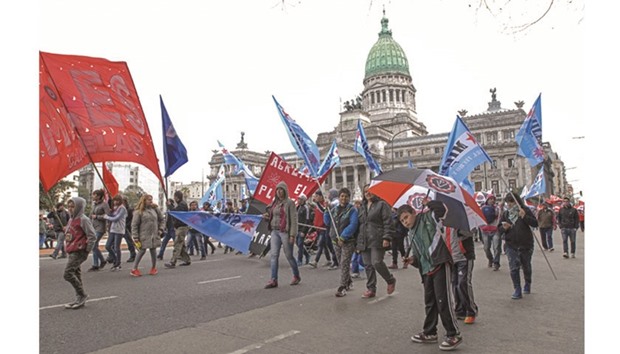Thousands of workers and members of leftist social movements descended on Buenos Aires’ Plaza de Mayo on Friday to protest the economic measures of centre-right President Mauricio Macri.
Many of the protesters, who had arrived from other cities in recent days, cut off access to bridges and main streets in the Argentine capital before gathering in the plaza to demand an end to austerity and more support for workers.
“Enough of poverty and inflation” read one sign. “No to higher tariffs” read another, a reference to Macri’s efforts to end gas and electricity subsidies.
Since taking power in December, Macri has implemented a slew of policies aimed at attracting investors to Latin America’s third-largest economy.
He eliminated currency controls and devalued the peso, which spurred inflation and decreased workers’ purchasing power.
The government says the measures were necessary to attract investment and restore growth after 12 years of high-spending leftist rule.
It expects inflation to fall from around 40% currently to 17% next year, when the economy is forecast to grow 3.5%.
Macri’s approval rating fell from 72% in January to 50% in July, according to pollster Ipsos.
Chile-based Latinobarometro released a report on Friday that said only 40% of Argentines approved of their government.
Unions hardened their stance against Macri last month and agreed to unify their efforts under the General Confederation of Labour, a trade union federation.
“There is nothing more democratic than the workers fighting for their rights,” said Daniel Catalano, secretary general of the ATE Capital union.
Catalano, one of several union leaders who gave lengthy speeches in the plaza, also expressed solidarity with Brazil’s ousted leader, Dilma Rousseff, and lamented the recent tilt to the political right seen in several South American countries. Macri’s efforts to curb spending have also been challenged in court.
The Supreme Court ruled the government must hold public hearings before reducing home heating gas subsidies and is expected to make a similar ruling regarding electricity subsidies next week.

Trade unionists from around Argentina take part in a protest in Buenos Aires on Friday.
